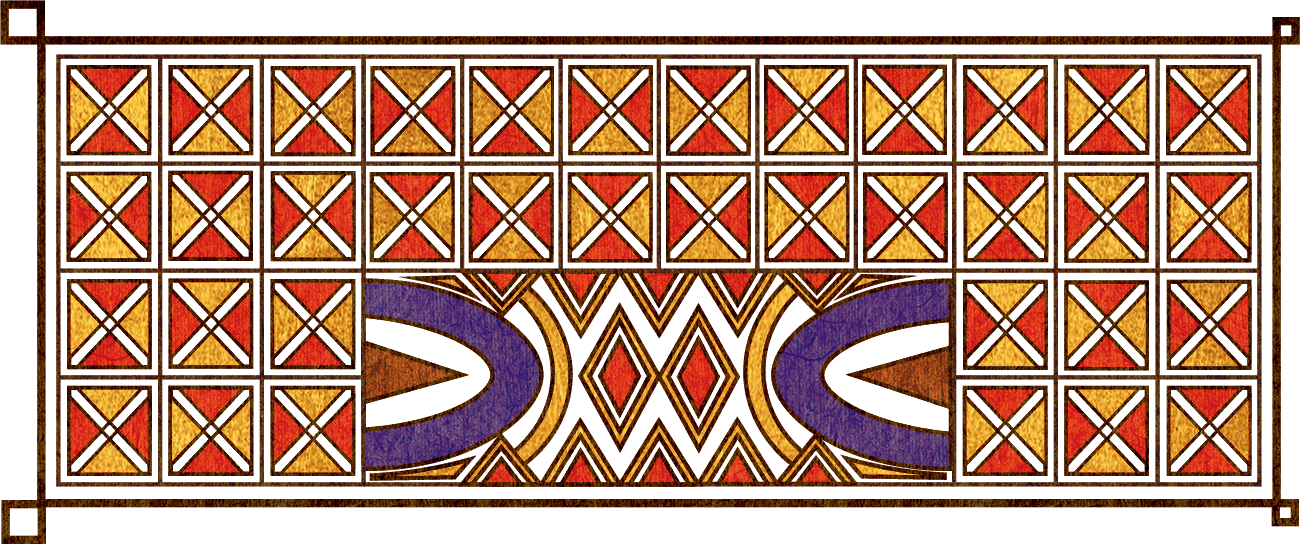السِّيرَةُ الذَّاتِيَّةُ
Biography
Nana Asma'u, full name
Asmaʾu bint Shehu Usman dan Fodiyo, was a princess, poet, teacher, jurist and scholar of the Sokoto Caliphate in modern-day Nigeria. She was born in 1793 and named after Asmāʾ bint Abi Bakr, a companion of Muhammad and half-sister of one of his wives. Her name also echoes the phrase al-Asmā' al-Husnā, "the most beautiful names of God".
She was born to the Shehu Usman dan Fodiyo, a scholar who later became the ruler of the great Sokoto Caliphate that ruled the northern provinces of Nigeria. She witnessed the 4-year jihad, the Fulani War, at 11 years old that led to the caliphate establishing its doimnance. This would become a key theme in her poetry.
From a family of intellectuals in the Fulani culture that created many of Nigeria's greatest scholars, Nana Asma'u was taught to read and write from a young age like her brothers. To learn about women in West African literature, read
here. Growing up in a multilingual society, she learned to speak Arabic, Hausa, and Tamashek Tuareg beyond her native language of Fulfulde, and would write in all of those languages in her lifetime.
Her first known delve into writing was translating her fathers' Arabic works into other languages. In 1811 at 19 years old she translated her fathers
Tabban Hakika (Be Sure of God's Truth) into Hausa, a guide to the laymans rights and responsibilities under Islamic Law. She turned the Arabic prose into Hausa poetic metre and this version became her fathers best known work.
Her first book was written in 1820,
the Way of the Pious, which started a hobby of hers in poetry and moral/legal guides.
She fathered multiple children in her life but never stopped writing, she also established a group of female teachers called jajiss specifically dedicated to teaching girls and women in reading and Quranic studies, as in Fulani society people were expected in high society to do so regardless of gender. Numerous works of hers are about Muslim women and their experiences. From a family of Qadirriyya Sufis, they saw learning without teaching as a fruitless endeavour.
Due to modern feminism and her role in women's education, she's one of few scholars with an available complete works online. Many schools are named after her in Nigeria and her poems frequently analysed. A list is provided next, first by language and then in chronological order:
- Works written in Fulani Ajami
- Poem: Fa'inna ma'a al-'usrin yusra (So Verily...) 1822
- Poem: Hi Nasaraku (Give us Victory) 1826
- Elegy: Sonnore Abdullahi (Elegy for Abdullahi) 1829
- Poem: Sunago (The Qur'an) 1829
- Poem: Wa'azi (A Warning) 1833
- Poem: Minsitare (Forgive Me) 1833
- Book: Gawakuke Famarde (Victory at Gawakuke) 1835
- Poem: Tindinore Labne (Sufi Women) 1836
- Elegy: Sonnore Bello (Elegy for Bello) 1837
- Poem: Gikku Bello (Bello's Character) 1838
- Elegy: Sonnore Mo'Inna (Elegy for My Sister Fadima) 1838
- Elegy: Sonnore Buhari (Elegy for Buhari) 1840
- Poem: Filitago (The Journey) 1840
- Book: Ko'iwi i'Shehu (The Story of the Shehu) 1841
- Poem: Mantore Arande (Rememberance of the Prophet) 1843
- Book: Te-Medde Jewego Fu-nbara (Caliph Aliyu's Victory) 1844
- Elegy: Sonnore Gidado (Elegy for Gidado) 1848
- Book: Jo-nde Wurno (Islam, Sokoto and Wurno) 1849
- Elegy: Sonnore Bingil (Elegy for a Youth) 1853
- Elegy: Sonnore Na'inna (Elegy for Na'Inna) 1854
- Elegy: Sonnore Mustafa (Elegy for Mustafa) 1855
- Poem: Mantore de Dabre (Rememberance of the Shehu) 1855
- Book: Gawakuke Ma'unde (The Battle of Gawakuke) 1856
- Elegy: Sonnore Zaharatu (Elegy for Zaharatu) 1857
- Elegy: Sonnore Hawa'u (Elegy for Hawa'u) 1858
- Book: Darnde-darngal Famarde (Fear of the Hereafter) 29 July 1860
- Elegy: Sonnore Halilu (Elegy for Halilu)
- Poem: Tifin Bawa (Destroy Bawa) 1861
- Elegy: Sonnore Fadima (Elegy for My Niece Fadima) 1863
- Poem: Bi Yalli ('Dan Yalli) 1863
- Elegy: Sonnore Malam Dandi (Elegy for Malam Dandi) n.d
- Poem: Yimrende Nana neide Ahmad Rufa'i (Poems Exchanged Between Asma'u and Ahmadu Rufa'i) n.d
- Poem: Mantore la-tabre (Rememberance of the Prophet) n.d
- Poem: Hulni-nde (Fear This)
- Works written in Hausa Ajami
- Book: Tabbat Hakika (Be Sure of God's Truth) 1831
- Poem: Tawassuli Ga Mata Masu Albarka (Sufi Women)
- Poem: Wakar Fadanci da Surorin Alkur'ani (The Qur'an) 1838
- Poem: Kiran Ahmada (In Praise of Ahmada) 1839
- Poem: Godaben Gaskiya (The Path of Truth) 1842
- Book: Murnar Kan Nasarar Yaki (Caliph Aliyu's Victory) 1844
- Elegy: Alihinin Mutuwar Halima (Elegy for Halima) 1844
- Book: Wa'azu (A Warning) 1856
- Poem: Rokon Ruwa (Prayer for Rain) 1857
- Book: Tsorace-tsoracen Tsayin Kiyama (Fear of the Hereafter) 29 July 1860
- Poem: Dalilin Samuwar Allah (Reasons for Seeking God) 1861
- Book: Labaran Shehu (The Story of the Shehu) 1864
- Poem: Wakar Gewaye (The Journey) 1865
- Elegy: Alhinin Mutuwar Modibo dan Ali (Elegy for Modibo dan Ali) n.d
- Poem: Sharuddan Kiyama (Signs of the Day of Judgement) n.d
- Poem: Begore (Yearning for the Prophet) n.d
- Works written in Arabic
- Book: Tanbfh al-ghafilin (The Way of the Pious) c. 1820
- Elegy: Marthiya Bello (Elegy for Bello) 1837
- Book: Tabshir al-Ikhwan (Medicine of the Prophet) 1839
- Poem: Qasida Fi'l Munaja (The Qur'an)1850
- Elegy: Marthiya Aisha I (Lamentation for Aysha) 1855
- Elegy: Marthiya Aisha II (Lamentation for Aysha) 1855
- Letter: Qasida min Asma'u da Mu'alim al-Murtanya (Welcome to the Mauritanian Scholar) n.d
- Poem: Mursalat al-Sha'ar (Poems Exchanged Between Asma'u and Shaikh Sa'ad) n.d
- Poem: Qasida min Aliyu bin Ibrahim (Poems Exchanged Between Asma'u and Aliyu) n.d
نانا أسماء، واسمها الكامل
أسماء بنت الشيخ عثمان دان فوديو، كانت أميرةً وشاعرةً ومعلّمةً وفقيهةً وعالِمة في خلافة صُكُتو الواقعة في نيجيريا الحديثة. وُلِدت عام ١٧٩٣ وسُمّيت تيمنًا بأسماء بنت أبي بكر، وهي صحابية وأخت غير شقيقة لإحدى زوجات النبي ﷺ. كما أن اسمها يذكّر بعبارة "الأسماء الحُسنى"، أي أسماء الله تعالى الحسنى.
وُلِدت لأبيها الشيخ عثمان دان فوديو، الذي كان عالِمًا ثم أصبح لاحقًا حاكمًا لخلافة صُكُتو العظمى التي سيطرت على شمال نيجيريا. شهدت عند سنّ الحادية عشرة الجهاد الذي استمر أربع سنوات، والمعروف بحرب الفولاني، والذي أرسى دعائم الخلافة وهيمنتها. وقد أصبح ذلك موضوعًا أساسيًا في أشعارها.
تنحدر من أسرة علمية في الثقافة الفولانية التي أنجبت كثيرًا من أعلام نيجيريا الكبار. وتعلّمت نانا أسماء القراءة والكتابة في صغرها شأنها شأن إخوتها. ولمعرفة المزيد عن النساء في أدب غرب إفريقيا، انقر
هنا. نشأت في بيئة متعددة اللغات، فأتقنت العربية والهوسا والتاماشق الطوارقية إضافةً إلى لغتها الأم الفُلفُلدِه، وقد كتبت بجميع هذه اللغات خلال حياتها.
كان أول إنتاجها المعروف في الكتابة ترجمة أعمال أبيها العربية إلى لغات أخرى. ففي عام ١٨١١ وهي في التاسعة عشرة من عمرها ترجمت كتاب أبيها
تَبَّت حقيقة ("تأكّد من حقيقة الله") إلى لغة الهوسا، وهو دليل لحقوق العامة وواجباتهم في ظل الشريعة الإسلامية. حوّلت النثر العربي إلى شعر بالهوسا، وأصبح هذا الإصدار أشهر أعمال أبيها.
وكان أول كتاب لها قد أُنجز عام ١٨٢٠ بعنوان
طريق الأتقياء، الذي دشّن هوايتها في نظم الشعر وتأليف الإرشادات الأخلاقية والفقهية.
أنجبت عدة أولاد لكنها لم تتوقف عن الكتابة، كما أسّست جماعة من المعلّمات تُعرف بـ "الجاجيس" خصّصتهن لتعليم البنات والنساء القراءة والدراسات القرآنية، إذ كان متوقَّعًا في المجتمع الفولاني، خصوصًا بين علية القوم، أن يتعلم الجميع بغض النظر عن الجنس. كثير من أعمالها تناولت النساء المسلمات وتجاربهن. ومن أسرة تنتمي إلى الصوفية القادرية، كانوا يرون أن التعلّم من دون تعليم الآخرين مسعى عقيم.
وبسبب مكانتها في تعليم النساء وصلتها بالفكر النسوي الحديث، فإنها واحدة من قلائل العلماء الذين تتوافر أعمالهم الكاملة على الإنترنت. وقد سُمّيت كثير من المدارس في نيجيريا باسمها، وتُدرَس أشعارها وتُحلَّل باستمرار. وفيما يلي قائمة بأعمالها، مرتبة أولاً بحسب اللغة ثم بحسب التسلسل الزمني:
- الأعمال المكتوبة بالفُلفُلدِه (عجمي)
- قصيدة: فإن مع العسر يسرا (١٨٢٢)
- قصيدة: هي نصرَك (امنحنا النصر) ١٨٢٦
- رثاء: صونّوري عبد الله (١٨٢٩)
- قصيدة: سوناغو (القرآن) ١٨٢٩
- قصيدة: وعظي (موعظة) ١٨٣٣
- قصيدة: مِنسيطارِه (اغفر لي) ١٨٣٣
- كتاب: غَواكُكِ فَمارده (نصر غَواكُكِ) ١٨٣٥
- قصيدة: تِندينوري لابنه (النساء الصوفيات) ١٨٣٦
- رثاء: صونّوري بَلّو (١٨٣٧)
- قصيدة: غِكّو بَلّو (خصال بَلّو) ١٨٣٨
- رثاء: صونّوري مُعِنَّه (رثاء لأختي فاطمة) ١٨٣٨
- رثاء: صونّوري بُخاري (١٨٤٠)
- قصيدة: فِليتاغو (الرحلة) ١٨٤٠
- كتاب: كُويْوي إش-شيخو (قصة الشيخ) ١٨٤١
- قصيدة: مَنتورِه أرانده (ذكرى النبي) ١٨٤٣
- كتاب: تِ-مدّده جِوِغو فُنباره (نصر الخليفة عليو) ١٨٤٤
- رثاء: صونّوري جِدادو (١٨٤٨)
- كتاب: جُندِه وُرنو (الإسلام، صُكُتو، وُرنو) ١٨٤٩
- رثاء: صونّوري بِنغِل (رثاء لشاب) ١٨٥٣
- رثاء: صونّوري ناعِنّه (١٨٥٤)
- رثاء: صونّوري مصطفى (١٨٥٥)
- قصيدة: مَنتورِه دِ دَبْرِه (ذكرى الشيخ) ١٨٥٥
- كتاب: غَواكُكِ مَعوندِه (معركة غَواكُكِ) ١٨٥٦
- رثاء: صونّوري زَهَراتو (١٨٥٧)
- رثاء: صونّوري حواء (١٨٥٨)
- كتاب: دارنده-دارنغال فَمارده (خشية الآخرة) ٢٩ يوليو ١٨٦٠
- رثاء: صونّوري حليلُ (—)
- قصيدة: تيفِن باوا (دمّر باوا) ١٨٦١
- رثاء: صونّوري فاطمة (ابنة أخي) ١٨٦٣
- قصيدة: بِي يَلّي ("دان يلّي") ١٨٦٣
- رثاء: صونّوري مَلَم دَنْدي (—)
- قصيدة: يِمرِنْدي نانا نَيْدِ أحمد رُفَاعي (قصائد متبادلة) —
- قصيدة: مَنتورِه لا-تبرِه (ذكرى النبي) —
- قصيدة: هُلنِ-نده (خَفْ هذا) —
- الأعمال المكتوبة بالهوسا (عجمي)
- كتاب: تَبّت حقيقة (١٨٣١)
- قصيدة: توسُّلي للنساء المباركات (النساء الصوفيات)
- قصيدة: وَكَر فَدانشي وسُرور القرآن (١٨٣٨)
- قصيدة: كيران أحمده (مدح أحمده) ١٨٣٩
- قصيدة: جُدابِن غَسكيا (طريق الحق) ١٨٤٢
- كتاب: مُرنَر كان نَصرَر يَكي (نصر الخليفة عليو) ١٨٤٤
- رثاء: أَلِهِنِن موت حليمة (١٨٤٤)
- كتاب: وَعَزو (موعظة) ١٨٥٦
- قصيدة: رُكون رُوَا (دعاء المطر) ١٨٥٧
- كتاب: تْسوراشِه-تْسوراچِن تْسايِن قيامه (خشية الآخرة) ٢٩ يوليو ١٨٦٠
- قصيدة: داليلِن صَمُوَر الله (أسباب طلب الله) ١٨٦١
- كتاب: لَبَرَن شيخو (قصة الشيخ) ١٨٦٤
- قصيدة: وَكر غِوايِ (الرحلة) ١٨٦٥
- رثاء: أَلْهِنين موت مُديبو دان علي (—)
- قصيدة: شُرُودَّن قيامه (أشراط الساعة) —
- قصيدة: بِيغورِه (الحنين للنبي) —
- الأعمال المكتوبة بالعربية
- كتاب: تنبيه الغافلين (طريق الأتقياء) ح. ١٨٢٠
- رثاء: مرثية بَلّو (١٨٣٧)
- كتاب: تبشير الإخوان (طبّ النبي) ١٨٣٩
- قصيدة: قصيدة في المناجاة (القرآن) ١٨٥٠
- رثاء: مرثية عائشة الأولى (١٨٥٥)
- رثاء: مرثية عائشة الثانية (١٨٥٥)
- رسالة: قصيدة من أسماء إلى المعلّم الموريتاني (—)
- قصيدة: مرسلات الشعر (قصائد متبادلة مع الشيخ سعد) —
- قصيدة: قصيدة من عليو بن إبراهيم (قصائد متبادلة مع أسماء) —


To contact me, email at januwobe@gmail.com
Sources used:
Boyd, Jean, and Beverly Mack. Educating Muslim Women: The West African Legacy of Nana Asma’u 1793-1864. Kube Publishing Limited, 2013.
Not accessible online, indirectly sourced through online articles
Boyd, Jean. The Caliph’s Sister: Nana Asma’u, 1793-1865, Teacher, Poet and Islamic Leader. Routledge, 2013.
Not accessible online, indirectly sourced through other articles
Jean Boyd, and Beverly Mack. Collected Works of Nana Asma’u: Daughter of Usman ’Dan Fodiyo (1793-1864). Michigan State University Press, 1997.
Accessed directly through
here
Mack, Beverly B., and Jean Boyd. One Woman’s Jihad: Nana Asma’u, Scholar and Scribe. Indiana University Press, 2000.
Not directly accessible online, sourced through other articles



